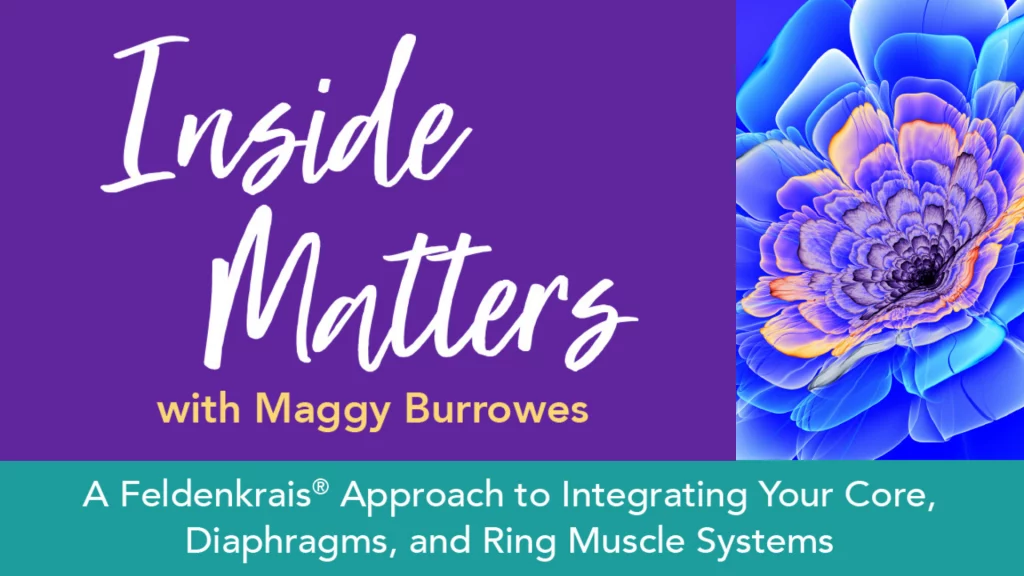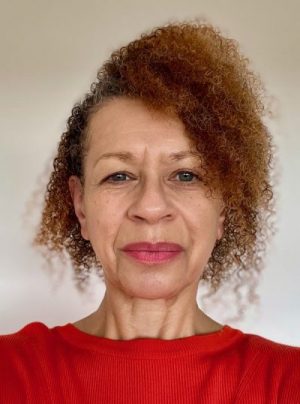Hello, I’m Maggy Burrowes, welcome to my site
This website is both an information hub for all aspects of The Feldenkrais Method® and a continuously-developing resource for anyone interested in exploring on-going personal growth, and maturing into their most fully potent self.
Effortless Daily Immersive Courses – Spring 2026
Online–Recordings & Notes included – or sign up for the recordings if you cannot join us live…
Times: 2–3.30pm GMT ~ 9–10.30am EST ~ 6–7.30am PST – please note we start 1 hour earlier on Wednesday
£100 (suggested fee, or any donation welcome)
Effortless Transitions
Reverse-Ability Is Your Superpower
April 6th – 10th
As quantum physicists are fond of pointing out, gravity is a surprisingly weak force, and yet the ageing process seems to steadily and unavoidably drag us downwards as if it were irresistible. Over time much of what we do on a daily basis can become automated and barely-conscious, so that too many of us huff and puff and sigh and groan our way through the activities of our day, dragging ourselves out of bed, collapsing into chairs and then hauling ourselves back up again, and grunting if we pick something up from the floor – having braced ourselves in order to be able to bend down in the first place!
When we move in a ‘well-organised’ way we barely notice the muscular power we are using, each of our actions transitioning smoothly into the next, powered by the clarity of our embodied awareness rather than muscular effort. This is because when we move the way we evolved to move our bones are supporting as much of our weight as possible at every stage of motion, leaving our muscular and fascial tissues free to respond to our intentions spontaneously and efficiently.
Once we learn how to recognise and release unconscious resistance then the elegance of our human design allows for each of our actions to flow easily into the next, so that all our transitions – lying to rolling, rolling to sitting, sitting to standing, standing to walking, walking to dancing – can be smooth and fluid, and we find ourselves moving with effortless lightness and grace. This Daily Course will explore the many possible ways that you can experience effortlessness in every aspect of your life – physical and emotional.
Effortless Feldenkrais–A Testimonial…
I am pleased to say I am getting great feedback about these Effortless Feldenkrais Daily Courses – this lovely letter came earlier this week:
Hi Maggy!
Thank you so very much for the course Effortless Sitting!
I have now started to repeat the course…because it has done a miracle with my sciatica!
From the first lesson my sciatica decreased …Before the course I had big problems…I could sit but not lie down…even in bed at night I had severe pain and I need to eat pain reliever to be able to sleep, at least some hours…I also had problems with walking….and all this had been going on for at least two months…
After the first lesson I could sleep without pain! Amazing!
Now, after the fifth lesson I have no pain from my sciatica…I’m sleeping at night and I do not need pain reliever! This is a miracle!
Thank you so very much!
Kind regards
Christina Fagrell
Potent Voice Workshops
Monthly On Sundays:
Online – Recordings & Notes included – or sign up for the recordings if you cannot join us live…
2pm – 5pm GMT/BST ~ 9am – 12pm EST/EDT
£45 (suggested fee, or any donation welcome)
The fee includes notes to make it easy for you to continue practising at home, and to minimise the need for note taking during the class.
Coming up…
Potent Voice–Access Your Full Vocal Range
Sunday March 8th
*THIS IS THE DAY THAT THE US CHANGES OVER TO DAYLIGHT SAVINGS TIME, IN THE UK WE ARE STILL ON GMT, SO, JUST FOR TODAY…
2pm – 5pm GMT ~ 10am – 1pm EDT
Human voices can access four registers, each with a distinctive tonal quality, but with overlapping pitch ranges and of widely differing usefulness for speakers, singers and other performers.
The register we all use naturally for speech is by far the most rich and resonant of the four, but we are often aware of other possible vocal sounds we can produce and may experience the change in register from ‘chest’ to ‘head’ voice and back as a real barrier to developing the higher notes that confident performance can require.
In this class we will explore all four vocal registers and play with the different possibilities they offer – finding a deeper voice, accessing higher notes, playing with vocal fry, learning how to yodel, shifting between registers with more ease, and how these different abilities can be used for vocal healing.

My Potent Voice workshops are beneficial for:
Singers, presenters, performers, and anyone interested in the voice, and any aspect of self-expression
Anyone dealing with chronic stress issues, or breathing problems/conditions
Anyone dealing with chronic tension in the face, tongue, jaw, neck, and throat
Anyone interested in meditation, chanting, and neural self-regulation
Anyone who feels that emotional inhibition is limiting their capacity for self-expression and self-assertion.
I am now planning my Summer Schedule…
– here are some dates for you, there is more information coming soon on this very website!
Effortless Squatting – May 4th – 8th
Potent Listening – Voice Summer School – June 1st – 5th
Potent Breathing – Sunday workshop – July 5th
Feldenkrais For Life! – Rejuvenate Yourself Summer School – August 10th – 21st
Please do contact me with any questions you may have, and note that BOOKING IS BY EMAIL, so you can contact me via this link if you want to reserve your place for any of my online events.
You are also always welcome to sign up for the recordings and notes of any course should you be unable to join us live.
Feldenkrais® Access Courses – Now Available On-Demand

Some of you know I have been planning to find the time to record some on-demand courses of my own for a while now, so I am delighted to be given a bit of a ‘head start’!
I am now an official Feldenkrais Access Affiliate – which means I will get a percentage of any amount you pay.
On this page you will find brief descriptions of these courses, all of which focus on internal integrations of our sphincters, our diaphragms, and all our ‘core’ structures with our skeleton.
Well-Connected (the most recent course) develops these subtle internal themes specifically for those with joint hypermobility, and this makes it an ideal set of lessons for anyone interested in Feldenkrais who is also dealing with chronic health issues – pain, fatigue, anxiety, posture problems, etc.
Follow the links to the relevant articles on this website for more details. Here’s my affiliate link again – it will take you to more information on the Feldenkrais® Access website – including free full-length Awareness Through Movement lessons, one from each course, so you can ‘try before you buy’.
Do not hesitate to get in touch with me if you have questions about any of these courses.

FaceBook Pages that may interest you…
HumanSong––Self-Expression & Performance
Movement Is Life!
No class on April 8th – Easter Break
Telegraph Hill Centre – Studio 2
Kitto Road, SE14
Awareness Through Movement Drop-In Class
Wednesdays 2.45pm – 4pm
£12.50 / £10 (low income)
“Movement is all important. From cardiovascular health, bone density, joint functioning to central nervous system optimisation. For the health of each and every cell in your organism, to your mental wellbeing and overall happiness. Movement is life. And life is movement!“
Rodolfo R. Llinás, MD, PhD
…but the phrase was a big favourite with Moshe Feldenkrais as well – I wrote a blog post about it…

Customised Workshops for Companies & Organisations
I am always happy to design a workshop for a specific purpose – good ergonomic self-use for office workers, good vocal self-use for performance communities, good performance skills for everyone – contact me to discuss what you would like.
